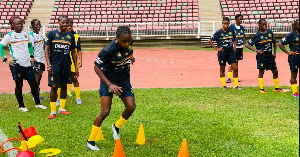"I just couldn't bring myself to look at his body again; it was so badly mutilated... I couldn't recognise him at first," the wife of Meschak Yebei told me outside a hospital mortuary in the western Kenyan town of Eldoret.
Lillian Yebei said that her husband, who was due to appear as a defence witness at the International Criminal Court in The Hague, had disappeared 10 days earlier.
Continue reading the main story “Start Quote
He was a good man, a reconciler and I don't know why someone would kill him”
Meschak Yebei's wife His body was found over the weekend about 40km (25 miles) from his home in a river, caught up between some rocks.
It is not clear who was behind the killing - the authorities say they are investigating.
But the family firmly believes the motive was because of his association with the ICC.
And as brutal as the killing was, it was not unique in Eldoret, a town hit by the ethnic violence which following disputed elections in 2007.
Those believed to be responsible for that violence have been at the centre of ICC prosecutions.
Several families have reported the mysterious disappearance of relatives who had ties or were seen to be co-operating with The Hague-based court.
line Who was Meschak Yebei? Politically active since his early 20s in Uasin Gishu county Stood unsuccessfully in local elections for parties seen as representing rival ethnic groups Outed as an ICC witness in 2011, family said he received death threats According to the ICC, had been part of a witness protection scheme Killed after returning to Eldoret to see his sick child and pregnant wife Once owned a computer college in Eldoret At the time of his death at 34, earned a living buying and selling grain
Last month, the ICC chief prosecutor said that witness interference and intimidation had contributed to the crumbling of the case against Kenya's President Uhuru Kenyatta.
Several prosecution witnesses had recanted their evidence and others had disappeared under mysterious circumstances.
Problems with witnesses are not recent and go right back to when the ICC investigations began in 2010/11.
Human rights groups have accused the power-sharing government that took office after the 2007 poll and the current one of being reluctant to co-operate with the ICC - accusations rejected by both administrations.
The ICC initially indicted six people who were from both sides of the political divide in 2007. Of those six, who all denied the allegations, only two are now facing trial as the others either had their charges dropped or they were not confirmed.
'Death threats' So why is it that unlike any other case at the ICC, it is witnesses in the Kenyan prosecutions that have been so vulnerable to intimidation?
The answer may be that they were all high-profile figures with wide networks of supporters.
So the stakes were high.
The court knew this and continuously urged the government to help safeguard the identities and welfare of all witnesses - prosecution and defence - and their families.
In the case of Mr Yebei, he was first outed in 2011 after an influential blogger, who now works at State House, leaked details of an email that contained the names of several witnesses.
The ICC was furious and promised to take action, but nothing happened. All those accused have always denied allegations of intimidating witnesses.
But since then, Mr Yebei's family says he has been living in fear.
He had reported threats to his life from people he knew numerous times to local police, but no action was taken.
The family moved twice within Uasin Gishu county to avoid being traced, then Mr Yebei decided to leave them behind and moving away under an ICC protection scheme.
'Close friends' Lawyers for Deputy President William Ruto, who with his co-accused journalist Joshua arap Sang are the two who remain on trial, say Mr Yebei was a "critical witness" in his case.
He is from the same ethnic group as Mr Ruto, but at the time of the 2007 election he was a co-ordinator for a rival party.
Party support in Kenya is often aligned to one's ethnicity, so his politics would have already put him at odds with his community.
Despite this, the family says Mr Ruto and Mr Yebei were close friends.
The Yebei homestead is not far from Mr Ruto's home - it is "just beyond those trees", as the family puts it.
A statement from the ICC said that Mr Yebei had been under security measures, including "a safe residency in a new location", and it does not know why he went back to Eldoret.
His family says it was to see his sick child and wife, who is due to give birth in February.
She showed me pictures of them together during an outing to a beautiful waterfall near their home.
The 34-year-old, who earned his living buying and selling cereals such as maize, had remained active in politics - and those close to him say he was not easily swayed even if his stance was unpopular.
"He was a good man, a reconciler and I don't know why someone would kill him," the 30-year-old widow says.
"I have been left too soon."
Kenya's 2007/2008 poll violence:
1. Then-President Mwai Kibaki declared the winner of December 2007 elections - opposition leader Raila Odinga cries foul 2. Opposition protests lead to clashes with police and degenerate into ethnic violence across the country 3. Some 1,2000 killed and 600,000 fled their homes 4. Incumbent President Uhuru Kenyatta in Kibaki camp, was accused of orchestrating violence against ethnic groups seen as pro-Odinga 5. Incumbent Deputy President William Ruto in Odinga camp; accused of targeting pro-Kibaki communities 6. Mr Kenyatta and Mr Ruto form alliance and win March 2013 election
His death has been the talk of the town in Eldoret and beyond.
Tough questions linger about the police search following his disappearance on 28 December, with accusations that it was lax - as well as concerns about whether the culprits will ever be found and the motive known.
The police have not commented on the case, except to say it is under investigation.
But as the trial of the deputy president resumes later this month, the safety of witnesses will again be highlighted.
Mr Yebei's family feels let down by the authorities and the court itself.
They say he was a marked man, yet threats to his life were not taken seriously.
Opinions of Friday, 9 January 2015
Auteur: Emmanuel Igunza, BBC















